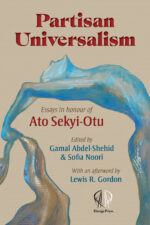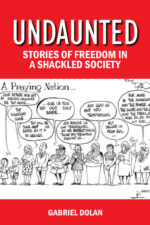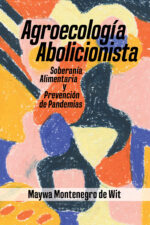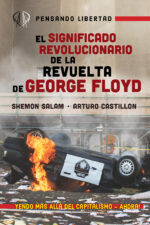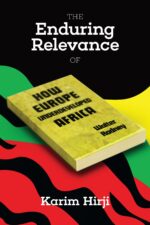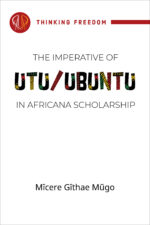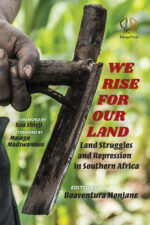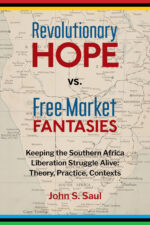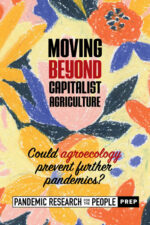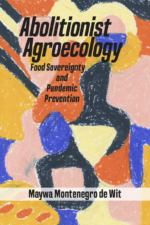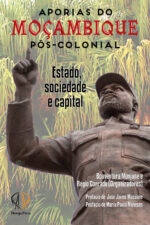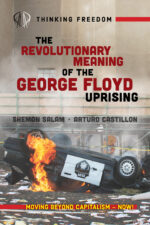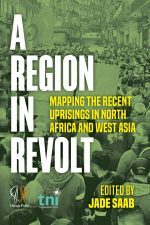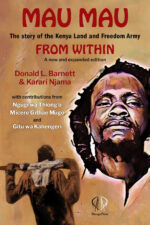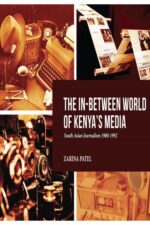-
Undaunted: Stories of Freedom in a Shackled Society
USD $ 20.00….to free oneself or assist in liberating others involves taking risks, being suspicious of the status quo, leaving the safety of the shore and launching out into the deep and the unknown. This is a very lonely calling too as one immerses oneself into the whole of reality with courage to confront and listen. Yet, the calling is not to be the liberator of the oppressed but to make a commitment to fight alongside them, as Paulo Freire wrote in Pedagogy of the Oppressed. — Fr Gabriel Dolan
From his work in Turkana, Kitale, Kapenguria and Mombasa, Father Gabriel reminds us that true transformative change comes from the people themselves, from the bottom up. This is a challenge that the social justice/human rights practitioners must internalize and the sooner the better. The idea of being the “voice of the voiceless” must transform to facilitating, encouraging and giving space to those who suffer the indignities of injustice, violence, poverty and repression. Indeed, one of the most significant tasks for the human rights community is to devolve away from Nairobi, in real, practical, and substantive ways.
It is not easy for a white man, with all the attendant privileges that brings, to become an integral part of the struggle for pro-poor transformative change in Kenya, and be subject to arrest, harassment, and repression. For those who read these memoirs, please circulate them to everyone you know. Translate them, read them in the mosques, churches and under trees so that Kenyans can get a sense of where we have come from, what we should avoid, and what it takes to make some gains that benefit the majority of our people. — Maina Kiai
This book is published by Zand Graphics Ltd (Kenya) in association with Daraja Press.
-
Agroecología Abolicionista, Soberanía Alimentaria y Prevención de Pandemias
Un sistema alimentario agroecológico no consiste más acerca de alimentos orgánicos que la abolición se refiere a abrir la puerta de una prisión. En este ensayo vital, Maywa Montenegro de Wit entrelaza ideas provenientes de las literaturas políticas y ecológicas más importantes de finales del siglo XX y comienzos del XXI. La pandemia proporciona un foco para estas dos fuentes de iluminación, pero la luz brillante que proviene de unir estas disciplinas brillará mucho después de que pase la sombra de la Covid-19. —Raj Patel, autor de Stuffed and Starved [Relleno y famélico].
El folleto resuena con la pregunta: ¿reforma o transformación? Pregunta: ¿mitigaremos y adaptaremos o revisaremos y cambiaremos nuestros imaginarios? Se nos ha dado un andamio para abordar el bastión del colonialismo y la colonialidad y para reconstruir los sistemas que ya han empujado su rodilla sobre los sistemas alimentarios y socioeconómicos que ya se estaban sofocando. Es hora de librarse de una pesadilla construida deliberadamente. – Nnimmo Bassey, autor de To Cook a Continent: Destructive Extraction and the Climate Crisis in Africa [El cocinar un Continente: Extracción Destructiva y Crisis Climática en África] y fundador de Health of Mother Earth Foundation [Fundación Salud de la Madre Tierra].
La COVID-19 y otros brotes zoonóticos como el ébola son ilustrativos de las complejas interacciones entre la deforestación, la pérdida de biodiversidad, la destrucción del ecosistema y la salud y seguridad humanas. Estos cambios son impulsados principalmente por la agricultura industrial y el sistema alimentario globalizados, respaldados por el ilógico y destructivo capitalismo racial. … Montenegro de Wit presenta argumentos convincentes a favor de cambios hacia sistemas agroecológicos diversificados que reconozcan las complejas interconexiones entre la salud humana y animal, entre las plantas y nuestro medio ambiente y futuro compartidos. De hecho, abordar las pandemias de manera sistémica no puede desvincularse de la construcción de economías y sistemas alimentarios que se basan en las necesidades de las personas, en particular de los pequeños agricultores, y de los ecosistemas prósperos. Para lograrlo, debemos rechazar y prohibir rotundamente la ecocida ilógica de la mercantilización, la financialización y el extractivismo, como fuerzas impulsoras de las fortunas y los destinos humanos y ecológicos. … El fortalecimiento de los movimientos sociales a nivel local es indispensable para forzar la ruta de África hacia un liderazgo político eficaz y democrático. Se necesita una clara ruptura, dejando atrás intervenciones a favor de un desarrollo ahistórico y tecnicista, donde la tecnología y la productividad se plantean como problemas y soluciones, hacia un replanteamiento urgente y drástico para hacer frente a las crisis sistémicas convergentes que enfrentamos hoy.
– Mariam Mayet, directora ejecutiva del African Centre for Biodiversity [Centro Africano para la Biodiversidad]
COVID-19 ha expuesto la naturaleza racializada de los sistemas alimentarios, pero también potencialmente otorga oportunidades para construir de nuevo. Maywa Montenegro explora una serie de averías, desde cadenas de suministro fracturadas hasta infecciones incontroladas entre trabajadores de alimentos esenciales, entre comunidades negras, marrones e indígenas atravesadas por el virus a lo largo de viejos surcos de opresión racial y de clase.
Ella rastrea los orígenes probables de COVID-19 a los sitios de derrame forjados por la expansión agroindustrial en regiones boscosas donde los patógenos brotan libres e infectan a los humanos. La agricultura animal industrial impulsa estos cambios ecológicos que incuban futuros brotes. Las pandemias tienen sus raíces en la separación violenta de las comunidades de sus territorios, semillas, conocimiento y riqueza. El racismo permite tal robo como fundamental para la expansión capitalista.
Para hacer frente a las pandemias y las injusticias alimentarias, Montenegro pide una agroecología abolicionista. Ninguna alternativa anticapitalista puede ignorar el racismo que es central para el sistema alimentario transnacional. Académicos como Angela Davis, Ruth Wilson Gilmore y Mariame Kaba han argumentado que aunque la abolición se ve con frecuencia como una estrategia de oposición, para erradicar, por ejemplo, las prisiones y la policía, la abolición es igualmente proposicional. Una agroecología abolicionista abre múltiples posibilidades que responden a las exigencias de un planeta pandémico: no hay una “normalidad” a la que podamos regresar con seguridad.
Esta es una traducción al español de Abolitionist Agroecology, Food Sovereignty and Pandemic Prevention
-
El Significado Revolucionario de la Revuelta de George Floyd
Si quieres poner la rebelión de George Floyd en su contexto político e histórico adecuado, esta es una de las obras con las que debes empezar. El Significado Revolucionario de la Revuelta de George Floyd plantea el caso incuestionable de que lo que presenciamos no fue solo una serie de eventos con el objetivo de reformar el imperio, como los medios burgueses quieren hacernos creer, sino un movimiento que en su corazón tenía y tiene como objetivo la erradicación del imperio y la construcción de un futuro nuevo e incierto. Este trabajo explica por qué y, además, aborda cómo puedes participar más profundamente.
– Kali Akuno, cofundador de Cooperation Jackson
Hablando sobre la descolonización, Fanon dice que cuando tratamos de cambiar el orden del mundo, esto es “claramente una agenda para el desorden total.” Con esto quiere decir que es una demanda absoluta, que no puede ser mediada por modificaciones de política. Esta demanda absoluta regresa en las llamas del Tercer Recinto en Minneapolis, en el verano de 2020. Nadie se ha acercado más que Shemon y Arturo en capturar esta lucha, en nombrar el carácter extraordinario y contradictorio de la Revuelta de George Floyd—cómo escapa la misma historia que la produce, única e inevitable, una verdadera insurgencia, progenitora de un centenar de formaciones contrainsurgentes. Estos comunicados de la rebelión ofrecen claridad sobre las desesperadas y extraordinarias victorias de la lucha y las formas que tomará el enemigo. Este texto es portador de las posibilidades, propuestas y problemas del verano; No puedo imaginar un mejor destino para la escritura.
– Joshua Clover, autor de Riot.Strike.Riot: The New Era of Uprisings
No hubo nada más que oscuridad en la primavera de 2020 cuando la pandemia de Covid-19 se enfureció y cerró la economía. Pero mientras que los manifestantes de derecha exigieron el fin del cierre de emergencia, un conflicto mucho más grande se estaba gestando bajo la superficie. Una rebelión exploto en Minneapolis en respuesta al asesinato policial de George Floyd, y durante la rebelion una estación de policía fue tomada y prendido fuego. Después de esto la revuelta se extendió rápidamente por todo los Estados Unidos. Los manifestantes saquearon los centros urbanos, lucharon contra la policía, quemaron coches de policía y destruyeron edificios de gobierno. El proletario negro lideró la carga, pero los proletarios blancos, latinos, asiáticos e indígenas también se unieron a la lucha, demostrando nuevas posibilidades para construir alianzas en esta sociedad segregada. Si bien las rebeliones contra la policía continuaron durante el verano y el otoño, el levantamiento retrocedió con el comienzo del invierno. Pero este conflicto está lejos de terminar.
Preparándonos para las grandes luchas que vienen, El Significado Revolucionario de la Revuelta de George Floyd proporciona un análisis de lo que sucedió durante los disturbios de 2020 en los Estados Unidos, sus potenciales, límites internos, e implicaciones estratégicas.
Esta es una traducción al español de The Revolutionary Meaning of the George Floyd Uprising
-
The Enduring Relevance of Walter Rodney’s ‘How Europe Underdeveloped Africa’
Soon after its publication in 1972, Walter Rodney’s How Europe Underdeveloped Africa gained global popularity among students, scholars, activists and people concerned with African affairs. His innovative application of the method of political economy transformed the paradigm for rendition of the continent’s past. Because it stridently took the traditional historians and the prevailing neo-colonial order to task, it was also pilloried by the defenders of the status quo. And, in these neoliberal times, mainstream scholars and pundits proclaim that it is no longer relevant for Africa.
In Walter Rodney: An Enduring Legacy, Karim Hirji makes a systematic case that, on the contrary, Rodney’s seminal work retains its singular value for understanding where Africa has come from, where it is going, and charting the path towards genuine development for its people. After giving a broad picture of Rodney and his times, Hirji examines in detail the criticisms levelled against his work, and conducts a focused review of modern day textbooks on African history. It is seen that most of the claims against Rodney lack a sound basis and that direct representations of his ideas are replete with distortions, unfair selectivity and political bias. Yet, the long term influence of Rodney on African history is unmistakable.
Hirji’s succinct, coherent defence of an intellectual giant who lived and died for humanity is an essential read for anyone with an interest in Africa and related regions.
You can read this book online for free.
Soon after its publication in 1972, Walter Rodney’s How Europe Underdeveloped Africa (HEUA) gained global popularity among progressive students, scholars and activists, and people concerned with African affairs. His innovative application of the method of political economy was a prime contributor to shifting the paradigm for rendition of the continent’s past as well as for visualizing its possible trajectory. Because it stridently took the traditional historians of Africa and the prevailing neo-colonial order to task, it was also vociferously criticized by the defenders of the status quo.
In these neoliberal times, its visibility has waned. Mainstream scholars and pundits from and outside of Africa proclaim that it is no longer a relevant work for Africa. In Walter Rodney: An Enduring Legacy, Karim Hirji makes a systematic case that, on the contrary, Rodney’s seminal work retains its singular value for understanding where Africa has come from, where it is going, and charting a path towards genuine development for the people of Africa.
Hirji considers Rodney in his unitary persona as a historian, theoretician and activist. He begins by outlining the publication history and contents of HEUA, and noting the comments it has drawn from varied quarters. This is followed by a depiction of the global context within which it saw the light of the day and the flowering of progressive thought and vision in those vibrant times. The retrogressive reversal, in thought and social reality, that has transpired since then is summed up next. An assessment of how HEUA has weathered this storm is also provided.The next chapter presents a brief portrait of Rodney as a revolutionary, with the focus on his seven years at the University of Dar es Salaam. This is followed by an overview of the methodological framework utilized in HEUA.
These five chapters lay the foundation for the main substantive part of Hirji’s book. This part begins with a detailed evaluation of the criticisms that have been levelled at HEUA. Subsequently, by a review of eight textbooks of general African history in common use today is provided. The aim here is to assess the persistence, if any, of ideas of the type promoted by Rodney in such books and identify the manner in which HEUA is directly depicted therein. Do these books give an adequate and fair depiction of Rodney to modern day students?
The penultimate chapter argues for the continued relevance of Rodney and his seminal text for Africa (and the world) in this anti-people, pro-capital, pro-imperial neoliberal era. Hirji concludes with a lively account of his own interactions over six years with Walter Rodney. With the focus on the issue of building socialism in Tanzania, a key dimension in the evolution of Rodney’s thinking is described in a critical spirit. The fundamental question addressed is, in our often dark, demoralizing political environment, what do Rodney and his life have to teach us on the matter of navigating between hope and struggle?
The conclusion emerging from this book is that in the first place most of the criticisms of the content, style and practical value of HEUA lack merit. The representation of Rodney in mainstream books is as well replete with distortions, unfair selectivity and political bias.
Despite these misrepresentations, Rodney and his ideas retain their signal value for understanding African history, for engaging with its present day conditions, and for projecting distinctive future scenarios for the continent. Hirji’s succinct work is a consistent, coherent defence of an intellectual giant, an astute historian and a compassionate revolutionary who lived and died for humanity. It is an essential read for anyone with an interest in African history, and the fate of Africa and the regions that are historically related to it.Walter Rodney: An Enduring Legacy
Karim F HirjiCONTENTS
Preface
1. The Book
2. The Global Context
3. A Grand Reversal
4. Rodney, the Revolutionary
5. Rodney and Historiography
6. Criticisms of the Book
7. Rodney in the Classroom
8. Contemporary Relevance
9. Hope and Struggle
Major Writings of Walter Rodney
References
Author Profile -
Moving Beyond Capitalist Agriculture: Could Agroecology Prevent Further Pandemics?
Moving Beyond Capitalist Agriculture is born out of the coordination between scholars and community organizers and it should be shared widely. The group behind it, the Pandemic Research for the People, is an expression of collective wisdom and necessary unease. In fact, organization and solidarity are two values to be cherished in this moment of multiple crises. COVID-19 is a neoliberal disease and agroecology that frees the land and people of greed and towards food sovereignty is the pathway out of this mess. — Saulo Araujo, US Friends of the Landless Workers Movement
If you want to know more about the connections between racial capitalism, industrial agriculture, environmental destruction, and epidemics and pandemics, then this is a great place to start. But this pamphlet is more than just an analysis of the immense problems generated by capitalism. More importantly, this pamphlet represents an attempt to overcome this system and to develop revolutionary alternatives to it. Rather than falling into the tempting illusion of reform, the authors of these texts give invaluable insights into how we might support and develop revolutionary forms of agro-ecology that can sustain and reproduce life outside of the racial capitalist machine that is destroying it.” — Arturo Castillon, co-author, The Revolutionary Meaning of the George Floyd Uprising
Increasingly threatening climate disaster coinciding with a pandemic has tragically illustrated that the world doesn’t have the luxury of dealing with one crisis at a time – and capitalist agriculture is at the root of both. The authors show convincingly that there is a better way: one that’s based on self-determination and building on human cooperation, not competition. This publication makes a strong case for agroecology as a crucial part of a future that puts people above profit; a future that assures people`s health by allowing planetary health to flourish. It will bring clarity to everyone trying to understand how the next pandemic could be averted whilst building a more just world — Vijoleta Gordeljević, Health economist and environmental health policy expert, People’s Health Movement.
Pathogens repeatedly are emerging from a global agrifood system rooted in inequality, labor exploitation, and unfettered extractivism by which communities are robbed of their natural and social resources. A crisis-prone economic system that prioritizes production for profit over meeting human needs and ecological preservation is organized around intense monocultural production that, along the way, allows the deadliest of diseases to emerge. The Pandemic Research for the People (PReP) focuses on how agriculture might be reimagined as the kind of community-wide intervention that could stop coronaviruses and other pathogens from emerging in the first place. We address how mainstream science supports the same political and economic systems that helped produce the pandemic. Then we introduce agroecology, an environmentalism of the peasantry, the poor, and indigenous, long in practice, that treats agriculture as a part of the ecology out of which humanity grows its food. Agroecology—a science, movement, and practice—combines ecological science, indigenous and peasant knowledges, and social movements for food and territorial sovereignty to achieve environmentally just food systems.
Peasant- and indigenous-led agroecology is uniquely positioned to limit the spread of zoonotic viruses: Post-capitalist agroecology champions the indigenous and smallholders who protect agricultural biodiversity. A diverse agroecological matrix of farm plots, agroforestry, and grazing lands all embedded within a forest can conserve animal biodiversity in the landscape. Agricultural biodiversity can make it more difficult for zoonotic diseases to prevail. Such a mode of conservation also takes into account the economic and social conditions of people currently tending the land, rather than a conservation that uproots people to foster the private accumulation of capital.
Contents: Introductory note / Globalized food systems, structural inequality, and COVID-19 / What is mutual aid? A COVID-19 Primer / Can agroecology stop COVID-21, -22, and -23? / Moving Beyond Capitalist Agriculture
-
Abolitionist Agroecology, Food Sovereignty and Pandemic Prevention
COVID-19 has exposed the racialized nature of food systems, but also potentially grants opportunities to build anew. Maywa Montenegro explores a series of breakdowns, from fractured supply chains to uncontrolled infection among essential food workers, among Black, Brown, and Indigenous communities scythed through by the virus along old grooves of race and class oppression.
She traces the likely origins of COVID-19 to spillover sites forged by agroindustrial expansion into forested regions where pathogens spring free and infect humans. Industrial animal agriculture drives these ecological changes that incubate future outbreaks. Pandemics have their roots in the violent separation of communities from their territories, seeds, knowledge and wealth. Racism enables such theft as fundamental to capitalist expansion.
To tackle pandemics and food injustices, Montenegro calls for an abolitionist agroecology. No anti-capitalist alternative can ignore the racism that is central to transnational food system. Scholars including Angela Davis, Ruth Wilson Gilmore, and Mariame Kaba have argued that although abolition is frequently seen as an oppositional strategy — to eradicate, for example, prisons and police — abolition is equally propositional. An abolitionist agroecology cracks open multiple possibilities that respond to the exigencies of a pandemic planet — there is no ‘normal’ to which we can safely return.
-
The Revolutionary Meaning of the George Floyd Uprising
There was nothing but darkness in the spring of 2020 as the Covid-19 pandemic raged and shut down the economy. But as right-wing protesters demanded an end to the lockdown, a much bigger social conflict was brewing under the surface. A rebellion exploded in Minneapolis in response to the brutal police murder of George Floyd in late May, during which a police station was overtaken and burned down. The uprising quickly spread across the United States as protesters looted downtown urban centers, set fire to cop cars, vandalized government buildings, and fought the police. The Black proletariat led the charge, but white, Latinx, Asian, and Indigenous proletarians also joined the fight, demonstrating new possibilities for building alliances. While anti-police rebellions continued throughout the summer and fall, the uprising receded with the start of the winter. But this conflict is far from over.
In an effort to think through the experience of the uprising and prepare for the great struggles that are coming, The Revolutionary Meaning of the George Floyd Uprising provides an in-depth analysis of what exactly happened during the 2020 uprising, its potentials, internal limits, and strategic implications.
-
Love after Babel and other poems
ANNOUNCEMENT: Love After Babel wins Nicolás Cristóbal Guillén Batista Outstanding Book Award by the Caribbean Philosophical Association
Congratulations to Chandramohan S!
Love after Babel is a collection of poems that deal with themes such as caste, the resistance of Dalit people, Dalit literature, islamophobia and other political themes, with almost one hundred poems divided into three sections (Call Me Ishmail Tonight; Name Me a Word; Love after Babel). The introduction is by Suraj Yengde (award-winning scholar and activist from India, author of the bestseller Caste Matters, inaugural postdoctoral fellow at the Initiative for Institutional Anti-racism and Accountability, Shorenstein Center on Media, Politics and Public Policy at the Harvard Kennedy School).
Chandramohan’s poems are dialogues of the ‘ self’ with the ‘other’. He brings to life a world that subverts myths, literary canons, gender and caste stereotypes by pooling in sparklingly new metaphors with sensitivity and care. He draws his images from contemporary incidents as well as myths and legends of yore, and delves deep into the politicized realm, thus ‘rupturing the hymen of demarcations’ of identity, resistance, repression and love.
—Babitha Marina Justin, poet, artist and academician
Chandramohan’s poetry is an extraordinary combination of a strong individual voice, crying out against a deeply felt sense of personal abuse, and a sophisticated understanding of the long history and mythology of such abuse, in India but also in the world at large. Mythological figures like Shambuka and Urmila illluminate, and are illuminated by, modern atrocities. The poems are by turns shocking, moving, and exhilarating. —Wendy Doniger O’Flaherty is an American Indologist whose professional career has spanned five decades.
Chandramohan S has the stark ability as a poet to react to any social happening, and these turn out to be in the most responses to societal happenings, plunged into the dark interiors of human behavior. So these could be related to caste oppression. Economic exploitation, religious polemics etc. But the poetic ability or the agility is always there to handle a situation born out of politico- social situations. There lies his remarkable dexterity as a poet commentator. His lines are direct, and even angry. But that does not matter. This is poetry- at its best. No wonder then that, his poems have been published world wide. He is perhaps now one of the very few, if not the only Indian poet in English to have taken the burden of social and political repression, as a distinct and livid political idiom. To read his poems is also painful, but the poetry is in the pain!—Ananya S Guha lives in Shillong in North East India. He has been writing and publishing his poetry for the last 33 years.
Love after Babel selected by as one of Twelve books that form part of the arsenal of Dalit writing by Suraj Yangde. surajyengde@surajyengde
surajyengde@surajyengdeHad an honor to introduce this extremely riveting collection of humanity-filled radical lines “Love After Babel” told by the incomparable art form—Dalit Poetry. Chandramohan is confidently flirtatious with his words. by
-
Mau Mau From Within: The Story of the Kenya Land and Freedom Army
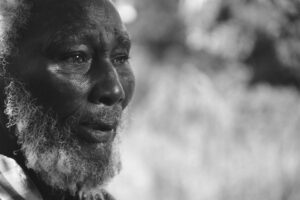
Karari Njama: Photo by Geoffrey Mwangi curated by Kairu Kuguru. The inside story of the struggles of the Kenya Land and Freedom Army, referred to by British colonialism as the ‘Mau Mau rebellion’, is little known today. The autobiographical material written by Karari Njama (a senior leader in the Mau Mau hierarchy) and compiled by Donald L. Barnett was first published by Monthly Review Press in 1966, as Mau Mau From Within: An analysis of Kenya’s Peasant Revolt. It was reprinted in 1970; it has remained out of print for many years. As the late Basil Davidson put it in his review of the first edition: “Njama writes of the forest leaders’ efforts to overcome dissension, to evolve effective tactics, to keep discipline, mete out justice … and to teach men how to survive in those merciless forests. His narrative is crowded with excitement. Those who know much of Africa and those who know little will alike find it compulsive reading. Some 10,000 Africans died fighting in those years . Here, in the harsh detail of everyday experience, are the reasons why.”
The book is an extraordinary story of courage, passion, heroism, combined with recounting of colonial terror, brutality and betrayal. It is a story of how the very idea of being ‘Kenyan’ was intimately linked to the idea of freedom, a connection that was destroyed not only by the firepower of the British, but also by those who collaborated and established themselves as the beneficiaries of neocolonial rule. Disconnecting notions of freedom from identity left only a caricature that rapidly descended into tribalism and ethnicity.
This momentous story of the struggle for freedom described here is relevant not only for a new generation of Kenyans but also for all those engaged in emancipatory struggles internationally. For so long as the experiences arising from the struggles described in this book are perceived as merely ‘African’ or ‘Kenyan’, it is not possible to fully grasp the contributions they have made to the struggle for a universalist humanity.
What is recounted in this publication is more than an ‘analysis of a peasant revolt’. It is above all a history of the Kenya Land and Freedom Army. As Ngūgī wa Thiong’o points out in his Preface to this new edition, ‘we don’t have to use the vocabulary of the colonial to describe our struggles.’ We were tempted to rename the book ‘Kenya Land and Freedom Army from Within.’ But because the original title has wide recognition, and and as one of the characteristics of movements of the oppressed is to appropriate derogatory terms used by their oppressors and repurpose them as an expression of pride in their own experiences, this book retains the original title, but with a change in the subtitle as ‘The Story of the Kenya Land and Freedom Army.’
We were delighted that Karari Njama was able to provide us with a Prologue to the new edition (Kamoji Wachiira, a former political prisoner, connected us with Karari and translated the text of the Prologue). Shujaa Hon Dr Gitu wa Kahengeri, Secretary-General of the Mau Mau War Veterans Association reminds us how the veterans of the liberation movement, like Karari Njama, continue to live in extreme poverty today despite the enormous contribution that they made to the struggle for freedom.
Kenya’s leading writer and academic, Ngūgī wa Thiong’o, points out in the Preface, how so much of the narratives about the Kenya Land and Freedom Army has been written from ‘without’, emphasizing the importance of a book that speaks to the personal testimony from within the movement. We are honoured to have Mīcere Gīthae Mugo, Emerita Professor of Literature at Syracuse University, provide reflections on the importance of the republication of this historical text. There are many who, as children, lived through the terrifying events of the Emergency during which so many were tortured and killed by the British (and their local collaborators) and whose psyche remains deeply affected by what they witnessed. Kamoji Wachiira describes some of these experiences vividly in his Introduction to the new edition. He highlights the extent of betrayal by successive post-independence governments, and the development of the post-independence revival of resistance which he was a central part of. He also emphasizes the importance for a new generation of Kenyans “to gain not only a deep understanding of Kenya’s revolutionary history but also to reflect on what lessons may be drawn for the struggle to achieve real freedom.”
The original publication had no biographical information about Don Barnett. Few are aware of the extent of Don’s political engagement with the cause of liberation, of which Mau Mau From Within was only one aspect. He was a founder of the Liberation Support Movement in Canada, and had close contact with the MPLA (Popular Movement for the Liberation of Angola). Don sadly joined the ancestors in 1975. We are fortunate, however, that Don and Daphne’s son and daughter, Michael Barnett and Dawn Barnett, were able to provide, together with Ole Gjerstad, a revealing biography.
We have endeavoured to retain the content of the original book (but for a few minor corrections) including the original Selected Bibliography. An updated Further Reading list is provided.
-
Transforming ourselves, Transforming the World: An open conspiracy for social change – Second Edition
You can watch / listen to a conversation between the author, Brian K Murphy, and David Austin here.
This is a new edition of the book originally published by Zed Books in 1999. The book includes an Introduction written by David Austin and an Afterword from the author, Brian Murphy.
This book is for all those – community workers, adult educators, social activists of every kind – who want to overcome pessimism and play a part in changing society in the direction of peace, justice and dignity for all human beings. As author Brian Murphy— the independent analyst, organizer, educator and writer, and former staff member of the social justice organization, Inter Pares—points out, many of us are pessimistic about our ability to change the world when confronted by destructive political and corporative forces and the destruction they wreak. Murphy reveals the social and personal dilemmas which hold people back from social engagement, and argues that the various constraints we face can be overcome.
In this new edition, David Austin explains in his Introduction why this book, first published in 1999, is perhaps more relevant to our times than ever, offering insights from his own experiences of engaging critically with the book and with others. (David Austin is author of Dread Poetry and Freedom: Linton Kwesi Johnson and the Unfinished Revolution, Fear of a Black Nation: Race, Sex, and Security in Sixties Montreal and the editor of Moving Against the System, The 1968 Congress of Black Writers and the Making of Global Consciousness.)
And in his new afterword, Brian Murphy reflects on the continued relevance of the original text, emphasizing how our humanity is being corroded and commodified. To reclaim our humanity, he argues, we must transform ourselves to transform the world.
Brian Murphy’s immensely inspiring book,Transforming Ourselves, Transforming the World, deeply challenges us to think and rethink everything we knew and thought we knew.—Nnimmo Bassey, Executive Director, Health of Mother Earth Foundation & Right Livelihood Award Laureate in 2010
We need more conversations like the one in this book, which are rooted in hope while honestly working through a foundational way of seeing and understanding ourselves in the bigger picture.— Christina Warner, Co-Executive Director and Director of Campaigns and Organising, Council of Canadians.
This is one of the coolest, enjoyable and important books I have read in recent years. Written from the heart as well as the head, it is a breathtakingly visionary, unique and insightful take on the life of the ultimate activist.—Hope Chigudu, Feminist activist
The republication of Transforming Ourselves, Transforming the World is a gift for our troubled times. All of us who share the drive to change our society will find encouragement and nourishment. This book offers a break from an all-too-common type of “activism” that demands harmful suppression of our individual creativity, freedom and health. What we have here is a celebration — and an entirely convincing validation — of a way of changing the world that is always nurturing and open-ended; a process of possibility and becoming, as we build on humanness to realise greater humanness. As Murphy puts it: “‘I will act, because it is sane, and healthy, and human to do so. We will act together, because it is sane, and healthy, and human, and more effective to do so. … This is how we can begin to develop an open conspiracy’”. I’m energised to sign up to this “open conspiracy”, and I’m sure many more readers will be too. — Mark Butler, co-author with Church Land Programme (South Africa) of in, against, beyond, corona
Table of Contents
Introduction to Second Edition: David Austin
Preface and Acknowledgements
The Challenge
1 The Courage to Be
2 The Dilemma of Action and the Psychology of Inertia
3 Confronting the Dilemmas: Beyond InertiaPossibilities in Process
4 The Missing Link
5 The Individual, the Visionary
6 Challenging the Established Rationality
7 Imperatives for Modern EducationThe Open Conspiracy
8 The Open Conspiracy: Allies for Health and Action
9 Theatres and Strategies: Embracing the Future
10 Education and the Open ConspiracyConclusion
Eclectic Notes on Knowledge and Action
Afterword
Afterword to the Second Edition – Brian Murphy
Related Reading
Further readingIndex
-
You’re Not Here
One brother goes missing in action in Afghanistan, the other falls in love with an Afghan girl in England.
Bitter divisions engulf an English town where young Muslims oppose the British army’s presence in Afghanistan, whilst white youth condemn the Muslims as traitors.
To the disgust of his white friends, 17-year-old Jake Marlesden, whose brother is missing in action in Afghanistan, is in love with Leila Khan, an Afghan. When Jake tries to find out what happened to his brother, neighbour turns against neighbour and lover against lover.
Leila joins young Muslims protesting against the returning bodies of dead British soldiers, and Jake stands with the families of the soldiers. The lovers fall apart.
But far off events, and sinister forces at home, bring the lovers together again in a journey in which they will not only discover themselves, but also heal the wounds of their families and friends.
This is the sequel to You’re Not Proper.
Set in and around Manchester, You’re Not Here is informed by Mehmood’s experience of growing up a working class Pakistani in northern England, combatting racism on the streets and being arrested. The novel explores the British Asian experience in the context of the “war on terror” and Islamophobia. “I have lived and fought against various waves of racism in Britain, but the current Islamophobic one, the new racism, is far more insidious and divisive than those which preceded it,” says Mehmood in his blog.
This novel is a sequel to You’re Not Proper, which explored, in the author’s words, “what it is to be a Muslim teenager in the west today”. While it featured two teenage women’s search for identity and belonging — one with a Pakistani father and white Christian mother, the other her Hijab-wearing school friend — Mehmood’s sequel is, interestingly, told from the point of view of a white working class British youth.
Jake’s father was in the army. His elder brother is missing in action in Afghanistan. Jake is in love with a Muslim girl. We are introduced to diverse Asian characters and to white racist friends of his brother, and to the tensions both within and between the two communities, through Jake’s eyes.
While the novel reads like a pacey thriller, the teenage love story is treated with convincing tenderness. And there is sympathy for British soldiers. One scene features physically and mentally scarred ex-soldiers discarded by the state, and Military Friends and Families Against War make an appearance.
http://socialistreview.org.uk/438/youre-not-here
The narrative is packed with authentic voices, often humorous observations and insights, The novel reads like a thriller. It reaches an action-packed and moving climax, but, unlike a thriller, we are left uneasy about what may happen next.
Helen Goodway, Red Pepper, Summer 2019

